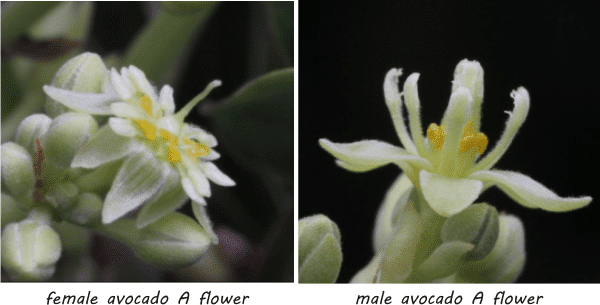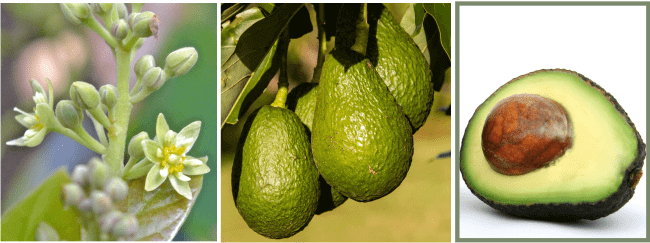Avocado (Persea americana) is a tree classified as a member of the flowering family Lauraceae. Its flowers produce nectar, which makes a honey good for anemia and with a taste different than any other honey.
Recent archaeological research has produced evidence that avocado was present in Peru as long as 8,000 to 15,000 years ago.
And no, contrary to what some people think, it is not cultivated only in Mexico and is not used only for guacamole! Today, it is cultivated in all tropical and Mediterranean climates throughout the world, and its uses are endless! Besides, the flowers’ nectar makes a really appreciated honey.
Avocado, the fruit, is also known as: palta, alligator pear, avocado pear, butter fruit (in some parts of India), luò lí or cheese pear (In Taiwan), “bơ” [ɓɘː] meaning butter (in Vietnamese), è lí meaning alligator pear or huángyóu guǒ meaning butter fruit (in eastern China).
There are many species of avocado and the fruit can have different shapes: pear-shaped, egg-shaped, or spherical and they all ripen after harvesting.
Today female, tomorrow male!
Pretty unstable, I could say!
I was surprised to find this about avocado. I mean, I know flowers can be male or female, or both. But to be one day morning female and tomorrow afternoon male… that was pretty amazing. And why would nature make it like that?
This is a sure way to prevent self-pollination.
Not to mention that there is something in avocado’s nectar that is disliked by honey bees and thus also preventing pollination. Why would nature do things to prevent breeding and eventually endanger a species? (Usually, this is human’s job 🙂 )
Avocados can be almost covered with hundreds of thousands of tiny flowers. But its flowers may one day be female, and the next day the same flowers will be male. The timing of this change is different in different avocado cultivars.
In some cultivars (known as A cultivars), a flower opens in the morning as a female with a stigma, then closes at about midday. It reopens in the afternoon of the next day, but this time as a male with pollen. The flower closes in the evening and stays closed. (A cultivars: Hass, Gwen, Lamb Hass, Pinkerton, Reed)
Or it’s the other way around in what we call B cultivars: flowers open in the afternoon as female, then reopen the next morning as male. (B cultivars: Fuerte, Sharwil, Zutano, Bacon, Ettinger, Sir Prize, Walter Hole)

see other amazing pictures on myavocadotrees.com
The fact that there are different cultivars with different female-male timings is a very good thing. That is why most avocado orchards have 2 different cultivars. When one cultivar has female flowers opened, the other one has male flowers opened. And then they bring honey bee hives into the orchard.
Honey bees needs to collect pollen from male flowers of one cultivar and transfer it to the female flowers of the other cultivar. But do they do that? …..not really.
Honey bees prefer to visit flowers from one tree and not move between trees. As a result, only about three flowers in every 1000 produce fruit. Dr. Mark Goodwin of Plant & Food Research, New Zealand, describes the strange system of flowering used by avocados to avoid self-pollination. He carried out experiments and did a hand pollination with a paintbrush, which led to a great pollination rate: about 70 flowers in 1000 produced fruit. You can watch a video on this here.
This is a reason why avocado honey is almost never pure, not even when the hives are placed in the middle of an avocado orchard. They visit other, more appealing flowers.
Honey bees don’t like avocado nectar!
The study Analyses of Avocado (Persea americana) Nectar Properties and their Perception by Honey bees (Apismellifera), by published in Journal of Chemical Ecology in
Avocado flowers are not attractive to bees, and they are not very beautiful from a human perspective either. But this is surely not the bees’ reason. In this study, the researchers characterized avocado honey and nectar with respect to their odor, color, and composition of sugars, phenolic compounds, and minerals. They tested how honey bees perceive these parameters, using the proboscis extension response bioassay and preference experiments with free-flying bees.
Just like with humans, there is a difference between young, inexperienced bees and mature, experienced ones. Naïve bees were indifferent to the odors of avocado and citrus flowers and honey, while experienced bees, which were collecting in the field during the blooming season, responded preferentially to the odor of citrus flowers.
The unique sugar composition of avocado nectar, which contains almost exclusively sucrose and a low concentration of the rare carbohydrate perseitol, and the dark brown color of avocado honey, had no negative effects on its attractiveness to the bees.
Phenolic compounds extracted from avocado honey were attractive to bees and adding them to a solution of sucrose increased its attractiveness.
Compared with citrus nectar and nonavocado honey, avocado nectar and honey were rich in a wide range of minerals, including potassium, phosphorus, magnesium, sulfur, iron, and copper. Potassium and phosphorus, the two major minerals, both had a repellent effect on bees. Yet, there may still be other possible explanations for the presence of repellent components in avocado nectar.
An older study, from 1972, also showed that potassium in onion nectar is to blame for the low attractiveness of onion flowers to honey bees.
But despite bees’ failure to pollinate avocado flowers, honey bees do make a really appreciated honey.
As for producing enough fruit for a very demanding market, nowadays pollination is often propagated through grafting to maintain a predictable quality and quantity of the fruit.
How is avocado honey?
This type of honey is very well known in all areas that grow avocado trees. From Southern Mexico and Western United States to Central America, Australia or other tropical regions. And everybody familiar with it knows that this honey tastes nothing like the avocado we all know from guacamole. Or smoothies. Or salads.
Color: Dark amber
Taste: robust and creamy, reminiscent of molasses, sorghum, or Luisiana-style cane syrup. Sometimes with an earthy taste. (not like the avocado fruit) Without bitter aftertaste.
Flavor: rich and buttery. More buttery than any other type of honey.
Some people say that it is more pleasant that clover, buckwheat, orange honeys. And some say it has a little stronger honey flavor than most of the other varieties. For others is smooth and tantalizing to the tongue and taste buds. But all agree that it is a buttery, molasses tasting honey.
Minerals: very rich in potassium, phosphorus, magnesium, sulfur, iron, and copper. Avocado honey is known for its high mineral content, though not all samples have shown the same constituents.
The study “Contribution to the study of avocado honeys by their mineral contents using inductively coupled plasma optical emission spectrometry” by Anass Terrab et al., from 2005, analyzed several avocado samples by inductively coupled plasma optical emission spectrometric and found 24 minerals in all of them!
The elements: Al, Ba, Ca, Co, Cr, Cu, Fe, K, Li, Mg, Mn, Na, Ni, P, Pb, S, Se, Si and Zn were detected in all samples; 7 elements were very abundant (Ca, K, Mg, Na, P, S and Si)
6 were not abundant (Al, Cu, Fe, Li and Zn)
11 were trace elements (As, Ba, Cd, Co, Cr, Mo, Ni, Mo, Pb, Se, Sr and V).
Sugars: among the sugars comon in all honey, avocado honey contains perseitol – a type of sugar that it can be considered a marker for avocado honey.
Crystallization: slow
Moisture content: high
Perseitol – a sugar that is specific to avocado honey.
The study Determination by near-infrared spectroscopy of perseitol used as a marker for the botanical origin of avocado (Persea americana Mill.) honey., by Dvash L from Israel, published in 2002, showed that near-infrared (NIR) reflectance spectroscopy may be used to to determine the concentration in honey of perseitol, a sugar that is specific to avocado honey. The results offer an accurate view whether that sample of honey contains avocado nectar in it, yet it does not authenticate avocado honey as unifloral. For this, there is still a need for a pollen laboratory analysis.
Health benefits of avocado honey
It’s honey, so the first health benefit is related to its capacity to heal skin conditions like wounds and burns. Then it is used internally for preventing and treating lots of conditions. Helps in insomnia, detoxifies the body, fuels the brain, supports immunity, helps with coughing (with coffee for adults, and with milk for children) and so many others.
Honey enhances the power of all natural products and even of antibiotics and chemotherapeutic drugs!
Avocado honey is especially good for anemia and calcium, magnesium, iron, potassium or phosphorus deficiency!
Avocado Honey is a dark honey and thus rich in antioxidants and polyohenols. This means that it helps in all conditions which involve antioxidant needs, from slowing age related conditions to regular colds.
Where can I find avocado honey?
If you live in tropical areas ask your locals first. They surely have it. If you live in colder areas then Amazon is your friend here, as are all the other online shops that you like.
Here are some examples.
Beware of phosphorus!
• Try to avoid avocado honey if you have chronic kidney disease or kidney failure
• Healthy people should also avoid high phosphorus intake and be aware that this type of honey contains phosphorus. Excess leads to cardiovascular disease, kidney problems and bone health concerns.
(In a paper published in the American Journal of Clinical Nutrition last November, high dietary phosphorus intake – more than 1,400 milligrams a day, which is double the daily recommendation – was associated with increased mortality in healthy people without kidney disease.
As for bone health concerns, a paper published in Annals of the New York Academy of Sciences says that “there is accumulating evidence that phosphorus added to the food supply may be contributing to the burden of osteoporosis in the population.” Several studies linked cola consumption with low bone density and fractures due to cola’s high phosphorus content.
Please note that you will need much more than a whole jar of honey per day to reach a high dose of phosphorus. But if you add it to other foods containing it, it is possible to reach that limit. Be balanced with all your food intake!
Phosphorus is contained in: meat, poultry, seafood, dairy foods, nuts, seeds, beans and whole grains. And any type of COLA!
In the kitchen.
Avocado honey pairs nicely with toasted, hearty breads like full seeded whole wheat, chocolate cakes, heavy sauces, etc. It is not expensive and is well worth the money.
==================
References and picture source:
Avocado flowers picture by Cayobo via flickr.com;
Featured avocado flowers – picture credit WhatsAllThisThen via flickr.com;
Avocado fruit hanging froma tree – picture credit Sandid via pixabay.com;
https://www.sciencelearn.org.nz/resources/73-avocado-pollination;
https://link.springer.com/article/10.1007%2Fs10886-006-9120-1;
https://en.wikipedia.org/wiki/Monofloral_honey

